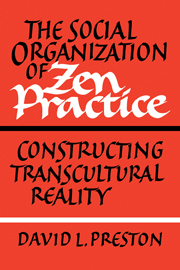The Social Organization of Zen Practice
Constructing Transcultural Reality
$41.99 (C)
- Author: David L. Preston
- Date Published: January 2012
- availability: Available
- format: Paperback
- isbn: 9780521183987
$
41.99
(C)
Paperback
Other available formats:
Hardback
Looking for an examination copy?
This title is not currently available for examination. However, if you are interested in the title for your course we can consider offering an examination copy. To register your interest please contact [email protected] providing details of the course you are teaching.
-
Preston provides both a first-hand account and a theoretical analysis of the way an American Zen community works. The form Zen practice takes in the United States is described in detail through close study of two Zen groups in southern California. Preston leads readers through the buildings and grounds of a Zen residential community and introduces them to the main forms of Zen practice, paying special attention to the styles and implications of meditation. The book's second half develops a theory of the nature of religious reality as it is shared by Zen practitioners. Prestonattempts to explain how this reality--based on a group's ethnography yet at the same time transcending it--relates to meditation and other elements of Zen practice by drawing on the notions of ritual, practice, emotions, and the unconscious found in the writings of Pierre Bourdieu, Randall Collins, Erving Goffman, and Emile Durkheim.
Customer reviews
Not yet reviewed
Be the first to review
Review was not posted due to profanity
×Product details
- Date Published: January 2012
- format: Paperback
- isbn: 9780521183987
- length: 190 pages
- dimensions: 229 x 152 x 11 mm
- weight: 0.3kg
- availability: Available
Table of Contents
Foreword Randall Collins
Preface
Part I. A Sociological View of Zen:
1. Approaching the study of religion
2. On going native
Part II. A Profile of Zen Membership and Formal Orgainzation in Southern California:
3. A profile of Zen membership
4. The physical layout of a Zen center
5. Formal organization and staff
Part III. The Zen Teacher:
6. The teacher
7. Daily schedule
8. Interaction with students
Part IV. What is Zen?:
9. Learning about Zen
10. Varieties of Zen practice
11. Zen viewed sociologically
12. Zen practice
Part V. Meditation as a Social Phenomenon: I:
13. Becoming a Zen practitioner
14. Consequences of meditative practice
15. Becker's model
Part VI. Meditation as a Social Phenomenon II:
16. The social constructionist view
17. Meditation defined
18. Some consequences of meditative practice
Part VII. Doing Zen Meditation:
19. Sudnow's view of improvised conduct
20. Using Sudnow to see Zen practice sociologically
21. The social organization of Zen meditation
22. Problems in Zen practice
23. An experience of sitting meditation
Part VIII. The Social Organization of Zen Meditative Ritual Practice and its Consequences:
24. Bourdieu's concept of habitus
25. Ritual, self-transformation, and reality construction
Part IX. The Meanings of Zen Practice:
26. Subjective (conscious) meaning
27. Objective (unconscious) meaning
Part X. Summary and Conclusions
Appendix
Notes
References
Index.
Sorry, this resource is locked
Please register or sign in to request access. If you are having problems accessing these resources please email [email protected]
Register Sign in» Proceed
You are now leaving the Cambridge University Press website. Your eBook purchase and download will be completed by our partner www.ebooks.com. Please see the permission section of the www.ebooks.com catalogue page for details of the print & copy limits on our eBooks.
Continue ×Are you sure you want to delete your account?
This cannot be undone.
Thank you for your feedback which will help us improve our service.
If you requested a response, we will make sure to get back to you shortly.
×







